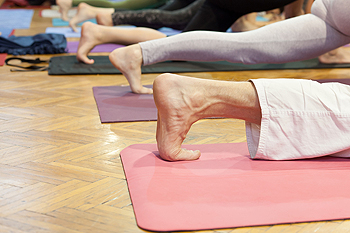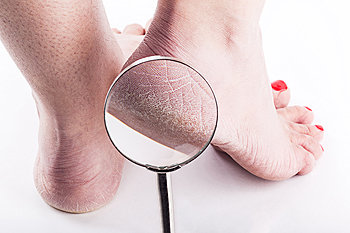Items filtered by date: October 2019
Why Choose Foot Surgery?
 Many patients choose to have foot surgery performed as an option to relieve severe pain and discomfort. Relief may be found when toenail removal is chosen to correct chronically infected ingrown toenails. Bunion surgery may be a choice to consider if the bunion is painful and unsightly. Research has indicated it is helpful to wear orthotics following a bunionectomy, as this may help to achieve long lasting relief. If pain is felt from a deformed ankle, the surgery that may help diminish the discomfort is referred to as an ankle fusion. Additionally, this type of surgery may help patients who have ankle arthritis, and neuromuscular disorders. If you have foot pain, and are considering surgery, it is strongly advised that you schedule a consultation with a podiatrist who can properly guide you toward making the choice that is correct for you.
Many patients choose to have foot surgery performed as an option to relieve severe pain and discomfort. Relief may be found when toenail removal is chosen to correct chronically infected ingrown toenails. Bunion surgery may be a choice to consider if the bunion is painful and unsightly. Research has indicated it is helpful to wear orthotics following a bunionectomy, as this may help to achieve long lasting relief. If pain is felt from a deformed ankle, the surgery that may help diminish the discomfort is referred to as an ankle fusion. Additionally, this type of surgery may help patients who have ankle arthritis, and neuromuscular disorders. If you have foot pain, and are considering surgery, it is strongly advised that you schedule a consultation with a podiatrist who can properly guide you toward making the choice that is correct for you.
Foot surgery is sometimes necessary to treat a foot ailment. To learn more, contact Dr. Odin De Los Reyes of Connecticut. Our doctor will assist you with all of your foot and ankle needs.
When Is Surgery Necessary?
Foot and ankle surgery is generally reserved for cases in which less invasive, conservative procedures have failed to alleviate the problem. Some of the cases in which surgery may be necessary include:
- Removing foot deformities like bunions and bone spurs
- Severe arthritis that has caused bone issues
- Cosmetic reconstruction
What Types of Surgery Are There?
The type of surgery you receive will depend on the nature of the problem you have. Some of the possible surgeries include:
- Bunionectomy for painful bunions
- Surgical fusion for realignment of bones
- Neuropathy decompression surgery to treat nerve damage
Benefits of Surgery
Although surgery is usually a last resort, it can provide more complete pain relief compared to non-surgical methods and may allow you to finally resume full activity.
Surgical techniques have also become increasingly sophisticated. Techniques like endoscopic surgery allow for smaller incisions and faster recovery times.
If you have any questions please feel free to contact our offices located in Southbury and Farmington, CT . We offer the newest diagnostic and treatment technologies for all your foot and ankle needs.
Why Live with Pain and Numbness in Your Feet?
Diabetic Patients and Exercising the Feet
 Patients who are diabetic can possibly benefit from performing stretches and exercising the feet. Neuropathy is a common foot condition that many diabetic patients experience, and it may help to incorporate balance exercises that can include riding a stationary bike and swimming. Research has indicated that it is beneficial to avoid performing exercises that can increase blood pressure, which may include strength training and cardiovascular routines. The feet can benefit from performing the correct exercise, and it is important to consider the specific foot condition. If you would like additional information about the benefits of exercising the feet, please consult with a podiatrist.
Patients who are diabetic can possibly benefit from performing stretches and exercising the feet. Neuropathy is a common foot condition that many diabetic patients experience, and it may help to incorporate balance exercises that can include riding a stationary bike and swimming. Research has indicated that it is beneficial to avoid performing exercises that can increase blood pressure, which may include strength training and cardiovascular routines. The feet can benefit from performing the correct exercise, and it is important to consider the specific foot condition. If you would like additional information about the benefits of exercising the feet, please consult with a podiatrist.
Exercising your feet regularly with the proper foot wear is a great way to prevent injuries and build strength. If you have any concerns about your feet, contact Dr. Odin De Los Reyes from Connecticut. Our doctor can provide the care you need to keep you pain-free and on your feet.
Exercise for Your Feet
Exercise for your feet can help you gain strength, mobility and flexibility in your feet. They say that strengthening your feet can be just as rewarding as strengthening another part of the body. Your feet are very important, and we often forget about them in our daily tasks. But it is because of our feet that are we able to get going and do what we need to. For those of us fortunate enough to not have any foot problems, it is an important gesture to take care of them to ensure good health in the long run.
Some foot health exercises can include ankle pumps, tip-toeing, toe rises, lifting off the floor doing reps and sets, and flexing the toes. It is best to speak with Our doctor to determine an appropriate regimen for your needs. Everyone’s needs and bodies are different, and the activities required to maintain strength in the feet vary from individual to individual.
Once you get into a routine of doing regular exercise, you may notice a difference in your feet and how strong they may become.
If you have any questions please feel free to contact our offices located in Southbury and Farmington, CT . We offer the newest diagnostic and treatment technologies for all your foot and ankle needs.
What Causes Cracked Heels?
 The condition that is known as cracked heels may occur as a result of frequently wearing shoes that have an open back. Additional reasons why this ailment may develop can consist of standing on hard surfaces for the majority of the day, or from medical conditions such as eczema or psoriasis. The skin on the outer edge of the heel is generally affected, and the cracks, or fissures can become painful if they are left untreated. Moderate relief can be found when the feet are washed and dried, followed by using a good moisturizer several times per day. If the skin on the heel begins to bleed, it is strongly suggested that you be under the care of a podiatrist who can properly treat and manage cracked heels.
The condition that is known as cracked heels may occur as a result of frequently wearing shoes that have an open back. Additional reasons why this ailment may develop can consist of standing on hard surfaces for the majority of the day, or from medical conditions such as eczema or psoriasis. The skin on the outer edge of the heel is generally affected, and the cracks, or fissures can become painful if they are left untreated. Moderate relief can be found when the feet are washed and dried, followed by using a good moisturizer several times per day. If the skin on the heel begins to bleed, it is strongly suggested that you be under the care of a podiatrist who can properly treat and manage cracked heels.
Cracked heels are unsightly and can cause further damage to your shoes and feet. If you have any concerns, contact Dr. Odin De Los Reyes from Connecticut. Our doctor can provide the care you need to keep you pain-free and on your feet.
Cracked Heels
Cracked heels appear unappealing and can make it harder for you walk around in sandals. Aside from looking unpleasant, cracked heels can also tear stockings, socks, and wear out your shoes. There are several methods to help restore a cracked heel and prevent further damage.
How Do You Get Them?
Dry skin is the number one culprit in creating cracked heels. Many athletes, walkers, joggers, and even swimmers suffer from cracked heels. Age and skin oil production play a role to getting cracked heels as well.
Promote Healing
Over the counter medicines can help, especially for those that need instant relief or who suffer from chronic dry feet.
Wear Socks – Wearing socks with medicated creams helps lock in moisture.
Moisturizers – Applying both day and night will help alleviate dryness which causes cracking.
Pumice Stones – These exfoliate and remove dead skin, which allows for smoother moisturizer application and better absorption into the skin.
Change in Diet
Eating healthy with a well-balanced diet will give the skin a fresh and radiant look. Your body responds to the kinds of food you ingest. Omega-3 fatty acids and zinc supplements can also revitalize skin tissue.
Most importantly, seek professional help if unsure how to proceed in treating cracked heels. A podiatrist will help you with any questions or information needed.
If you have any questions, please feel free to contact our offices located in Southbury and Farmington, CT . We offer the newest diagnostic and treatment technologies for all your foot care needs.
Helpful Tips On Elderly Foot Care
 Research has shown the importance for elderly people to properly take care of their feet. It may be difficult for seniors to bend down to trim their toenails, and they may benefit from having a caregiver or a relative help them accomplish this. If the patient is diabetic, any cuts, scrapes, or wounds on the feet need to be treated as quickly as possible. This can be helpful in preventing any infections from developing. Additionally, wearing socks that fit properly may be helpful controlling existing circulation conditions. The feet may change size as the aging process occurs, and it is suggested that the feet get measured regularly. This will help in determining the correct shoe size that will be comfortable to wear. Elderly patients may find it feels good to frequently stretch their feet, and this may benefit the overall health of the feet. If you would like additional information about how to help geriatric patients properly care for their feet, it is suggested that you consult with a podiatrist.
Research has shown the importance for elderly people to properly take care of their feet. It may be difficult for seniors to bend down to trim their toenails, and they may benefit from having a caregiver or a relative help them accomplish this. If the patient is diabetic, any cuts, scrapes, or wounds on the feet need to be treated as quickly as possible. This can be helpful in preventing any infections from developing. Additionally, wearing socks that fit properly may be helpful controlling existing circulation conditions. The feet may change size as the aging process occurs, and it is suggested that the feet get measured regularly. This will help in determining the correct shoe size that will be comfortable to wear. Elderly patients may find it feels good to frequently stretch their feet, and this may benefit the overall health of the feet. If you would like additional information about how to help geriatric patients properly care for their feet, it is suggested that you consult with a podiatrist.
If you need your feet checked, contact Dr. Odin De Los Reyes of Connecticut. Our doctor will attend to all of your foot and ankle needs and provide you with quality treatment.
Geriatrics and Podiatry
When people age, some common issues that may occur are bone density loss, dry skin, poor circulation, and rough brittle nails. These issues may also affect your foot health if the necessary steps are not taken to alleviate the problems.
It is important to take care of your feet because feet that are injured or diseased can affect your overall health. Having painful feet hinders your ability to do daily activities or may decrease your willingness to do the things that you need to do.
Visiting Your Geriatrician
As we age, health problems become more likely, so it is essential to visit your doctor for check-ups to ensure that you are doing the best you can to take care of your health. It is recommended to check your feet frequently for any possible cuts, bruises, swelling, corns or any other irregularities.
Taking Care of Elderly Feet
Cracked or dry feet can be treated by applying moisturizer often. It is also important not to wear old socks because the older the sock is, the higher the possibility there will be that there is bacteria there. Wear fresh socks and make sure they fit properly.
Proper foot health means that you can have a more active lifestyle and you will not be bogged down by pain. Foot health also leads to good circulation, which is paramount for overall health.
If you have any questions, please feel free to contact our offices located in Southbury and Farmington, CT . We offer the newest diagnostic tools and technology to treat your foot and ankle needs.

